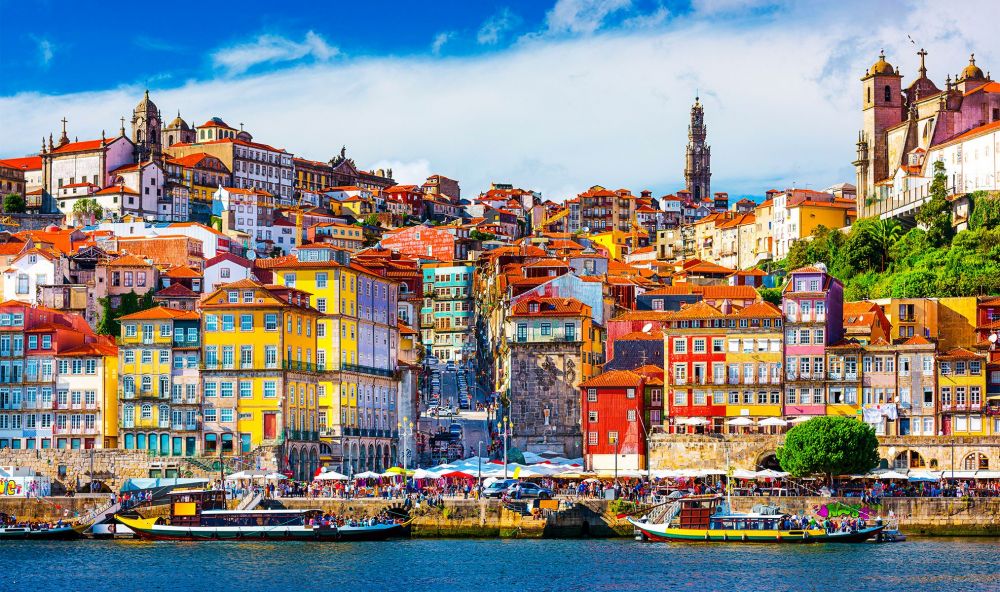Obtaining a Portuguese residence permit under the D7 program for financially independent individuals is a proven path to European residency without major investments. If you are considering moving to Portugal on this basis, our company offers professional consultations on organizational issues. We will help you collect documents, prepare an application and avoid typical mistakes. This will save you time and effort, especially when the rules change almost every year.
The program is available exclusively to citizens of countries that are not members of the European Union, the EEA or Switzerland. The main condition is the presence of regular passive income received outside Portugal. Applicants must be adults, have a clean criminal history and have housing in the country – their own or rented.
The D7 differs significantly from other Portuguese immigration programs. The main difference from the Golden Visa is the physical presence requirements. D7 holders are required to spend at least 16 months in the country during the first 2 years, while the Golden Visa requires only 7 days per year. In terms of financial requirements, the D7 is more affordable. The minimum passive income is €870 per month, as opposed to the investment of €250,000 for the Golden Visa. However, the D7 is designed for those who plan to actually live in Portugal, and not just get a spare passport.
Advantages of a Portuguese residence permit with a D7 visa
- Visa-free travel in the Schengen area, stay up to 90 days per six months.
- Road to obtaining EU citizenship. After 5 years of legal residence, you can apply for Portuguese citizenship and obtain a passport.
- Access to the public health system.
- Access to public schools and universities on equal terms with the Portuguese.
- The ability to work for hire and open your own business in Portugal after receiving a residence permit card.
- Inclusion in the application of a spouse, children under 21 and financially dependent parents with the same rights.
- Affordable financial requirements. Minimum passive income of 870€ per month and a deposit of 10,440€ in a Portuguese account.
- Exemption from taxes on foreign income. For non-residents, taxes are paid only on income received in Portugal.
Key requirements
The main applicant must prove a passive income of €870 per month – this is the Portuguese minimum benefit for 2025. Plus savings of €10,440 in a Portuguese bank account. For a spouse, 50% of the base amount is added (€5,220), for each child – 30% (€3,132).
What is considered passive income? Pensions, rent, dividends, royalties, interest from investments. Documents require proof of regular receipts for at least 3 months. Housing is mandatory. Purchased property or rent for at least 12 months. A clean criminal record is a given. Health insurance for €30,000 coverage for each family member.
The tax conditions have changed in 2025. The NHR (Non-Habitual Resident) program, which provided 10-year benefits with a flat 20% tax on certain income, closed to new applicants in March 2025. Now D7 residents fall under the regular Portuguese tax system with progressive rates from 13.25% to 48%.
Features of the status
Temporary residence is issued for 2 years with the possibility of extension for 3 years. After 5 years of continuous residence, the path to permanent residence or citizenship opens. For naturalization, you must pass an A2 level Portuguese language exam. The time starts counting from the moment of filing the application for residency, and not from receiving the card – this is an important change in 2024.
The first 2 years, you must stay in the country for at least 16 months. After the first extension – 28 months every 3 years. Absence for more than 6 months in a row or 8 months with interruptions may lead to the cancellation of the status. Exceptions are possible for work or family reasons, but require prior notification to AIMA.
Family reunification is one of the key benefits of the D7. You can include your spouse, children under 18 (or older if they are studying and financially dependent), and parents, provided that they are dependent. Minor siblings are also eligible for the program if they are under guardianship. Each family member submits a separate application, but they are considered simultaneously. The financial requirements increase proportionally – for a family of 4, you need to have €20,664 in a Portuguese account.
Cost of application:
Government fees and charges
The consular fee for a D7 visa is €110 per applicant, including children. Payments continue after residency is granted. After arriving in Portugal, applicants pay approximately €160 for the residence card and €156 for an appointment at AIMA.
Additional costs
Hidden costs can significantly increase the relocation budget. Medical insurance is mandatory for the duration of the visa – at least €30,000 coverage (costs €400-1,080 per year per person).
Housing costs vary greatly depending on the region. Rent for an apartment starts at €900 per month, plus a deposit of 1-2 months’ rent. Buying a property entails a stamp duty of 0.8% of the cost, a transfer tax of up to 8% and an annual municipal tax of 0.3-0.8%.
Preparing documents requires a separate budget. Translations and notarization cost from €200 to €1,000 depending on the country of origin. Obtaining a NIF costs €10-50 when using a representative, opening a bank account is usually free, but some banks require a minimum deposit.
Professional services are more expensive. Legal support ranges from €2,000 to €3,000 for the basic package, which includes document preparation and application submission.
Step-by-step application process
- Preliminary check. Preliminary assessment of the chances of approval is the first critical step. Analyzing the applicant’s documents, identifying potential problems at an early stage. This process helps to avoid costly refusals and significantly increases the success rate of the entire procedure.
- Obtaining a NIF (tax number). Without a Portuguese tax number, the process is impossible. Obtaining a NIF is done remotely by appointing a tax representative in Portugal. The procedure takes 5-7 working days, the cost of the service is 50-150 € depending on the region.
- Opening a bank account. A bank account is opened after receiving the NIF. The minimum deposit varies from 250 to 300 €, but for D7 it is recommended to deposit 10,440-15,000 €.
- Finding and registering a home. Applicants must prove that they have a home in Portugal. The entire process can be completed remotely using the services of real estate agencies.
- Making an appointment at the consulate. Submission of documents takes place in person at the Portuguese consulate in the place of residence. Submitting an application and waiting for a decision. The standard processing time is 60 calendar days from the moment the documents are received by the consular section. If approved, the applicant receives a temporary visa valid for 120 days.
- Moving to Portugal and meeting with AIMA. After receiving the visa, the applicant has 90 days to enter Portugal. The consulate schedules an appointment with AIMA to provide biometric data and submit documents for a residence card. The appointment must take place within 4 months of arrival.
- Receiving the residence permit card. Three weeks after the meeting with AIMA, the completed residence card is mailed to the applicant’s Portuguese address.
If the route map seems overwhelming, our company provides comprehensive turnkey services: from a preliminary assessment to receiving a ready-made resident card. We take care of all stages of the process, providing you with an easy path to the desired status.
Risks and how to minimize them
Risks in the process of obtaining a D7 visa often arise due to insufficient preparation of the applicant’s file. The most common problems also include the following.
- Insufficient evidence of passive income remains the main reason for refusals. Consulates reject about 15-20% of applications for financial reasons. Cases where applicants confuse active and passive income are especially critical.
- Banking problems create additional barriers. Some Portuguese banks require a significantly larger deposit than the officially stated 10,440€. Applicants from certain countries may face a requirement to have an amount of 40,000€ or more in the account.
The experience of our company’s experts in solving these problems has been accumulated thanks to a comprehensive approach to the issue. To eliminate any risks, experts develop personal strategies, ensuring approval even in difficult situations where standard approaches fail. Individual analysis of the applicant’s situation allows our clients to avoid typical mistakes and obtain residency within the established time frame.
Comparison of programs in different countries
European visa programs for financially independent individuals present a diverse picture of opportunities. Each country builds its own strategy for attracting wealthy residents, which creates high competition. Let’s compare the conditions of the most popular jurisdictions.
| Country and program | Minimum income (per main applicant, per year) | Additional per family | Minimum stay | Work permit | Duration and extension |
| Portugal (D7) | €10,440 (€870 per month, passive income such as pensions or dividends) | +50% (€5,220) for spouse, +30% (€3,132) for child | 183 days per year or 16 months for the first 2 years | Allowed, including freelancing or business | 4 months visa, then 2-year card, extendable for 3; Permanent residence after 5 years |
| Spain (Non-Lucrative Visa) | 28,800€ (400% IPREM, passive income without work in Spain) | +7,200€ for each dependent (spouse, child) | No strict minimum, but for extension – real residence | Prohibited | 1 year, renewable for 2 years; Permanent residence after 5 years |
| France (Visiteur for the financially independent) | About 15,632€ (equivalent to SMIC, passive income without work in France) | +15,632€ for each dependent (spouse, child, parent) | 183 days per year for renewal | Prohibited | 1 year, unlimited renewal; Permanent residence after 5 years |
| Italy (Elective Residence) | 31,000€ (passive income from abroad) | +20% (about 6,200€) for a spouse, +20% for a child (total 38,000€ for a couple) | No strict requirements, but for extension – actual residence | Prohibited | 1–2 years, extension; permanent residence after 5 years |











